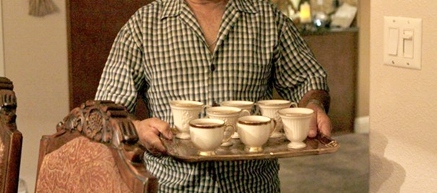There I was, a bride at the tender age of 20, living in a cozy townhouse with my husband and eagerly awaiting my first houseguests as a newly married woman. Excited and nervous, I couldn’t help but wonder if I’d live up to the high standards of being a good Assyrian housewife. Both my husband and I are of Middle Eastern descent, Assyrian to be exact, with me being the more “Americanized” one, since I was born and raised in the U.S., while my husband immigrated there at the age of 15. I grew up in a traditional Assyrian home and was used to our distinct ways and customs. But now, as a married woman, my upbringing and traditions were going to be put to the ultimate test, as I prepared for my guests.
The table was set with every lavish and tasty pastry from the local Assyrian market. The house had been deep-cleaned earlier that morning, and we were both ready to entertain. The doorbell rang and in walked my mother and grandmother. We sat in the family room making small talk, while snacking on the mini-feast I had set out on the coffee table. Then came the moment of truth: the serving of the tea.
According to tradition, Persian tea is served with the desserts and fruit in lieu of coffee, and the woman of the house always does the serving. Because I grew up in an arguably spoiled manner, and was rarely responsible for any household chores, I did not have the slightest idea of how to traditionally serve tea. Somehow I made my way to the kitchen, worked some kind of magic and came out holding an ornate tray of tea cups. We all continued to drink and laugh and I began to relax as I knew I had completed my wifely duty successfully. Or so I thought.
Noticing the now empty cups sitting on the coffee table, my husband without hesitation took them back in the kitchen and refilled each one. When he came out, I was met by my grandmother’s disapproving and disappointed glares. Apparently, this was a big no-no in our culture. It is specifically the woman’s duty to take care of her guests, especially the act of pouring the tea.
My grandmother didn’t articulate her true thoughts to me until the next day. She thanked me for our hospitality yet clearly stated that never again was my husband to pour her tea. She went on to reveal her embarrassment at having a man serve her and warned that this could not continue. To me, this was pure comedy; to her this was simply to what she had always been accustomed. We politely finished the conversation, and I soon realized that even though this woman served as a teacher to me throughout my childhood, it was now my turn to educate her on the modern day practices of my household.
Many more visits took place thereafter and my new “Americanized” tradition continued. I poured the first round of tea, and my husband poured the second and sometimes even third rounds. My once embarrassed and shy grandmother slowly became accustomed to this foreign practice.
I knew we were all beginning to understand each other just fine when I heard my grandmother say to my husband, “Emil, can you pour me another cup of tea please.”


































